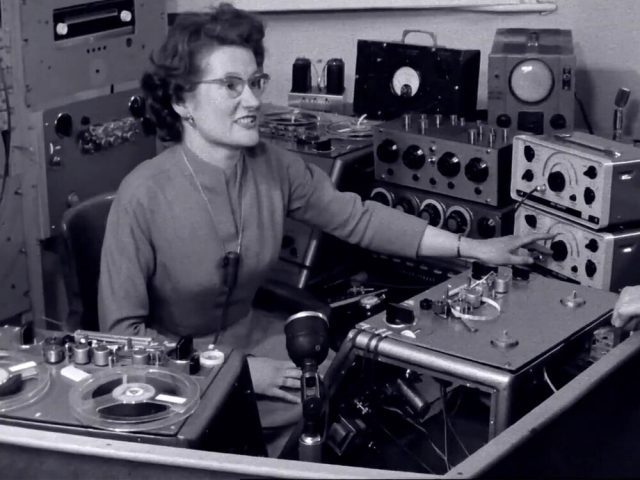
Daphne Oram is one of the women pioneers of electronic music featured in Sisters with Transistors
SISTERS WITH TRANSISTORS (Lisa Rovner, 2020)
Metrograph Digital
June 3-9
metrograph.com
sisterswithtransistors.com
“This is the story of women who hear music in their heads, of radical sounds where there was once silence, of dreams enabled by technology,” Laurie Anderson says at the beginning of Lisa Rovner’s revelatory Sisters with Transistors, which is back by popular demand for a return engagement on Metrograph Digital. In the film, available June 3-9, Rovner highlights electronic musicians Clara Rockmore, Delia Derbyshire, Daphne Oram, Éliane Radigue, Maryanne Amacher, Bebe Barron, Suzanne Ciani, Pauline Oliveros, Laurie Spiegel, and Wendy Carlos, trailblazers who deserve more recognition for their ingenuity and their influence on the music of today while blasting through gender stereotypes of the mid-twentieth century and beyond. “Technology is a tremendous liberator,” Spiegel notes. “It blows up power structures.”
In her feature-length debut, writer, director, and coproducer Rovner (Constellations) uses archival footage of Rockmore playing the Theremin with a string quartet in 1934, Derbyshire and Oram explaining how they constructed their unique arrangement of tape reels and computers at the BBC Radiophonic Workshop in the 1950s and ’60s, Ciani twisting nobs on a wire-laden setup at the Bonino Gallery in New York City in 1974 (and later performing on The David Letterman Show), Radigue talking about how she employed the sounds of airplanes to develop her electronic compositions, Carlos developing her own software and adjusting the synthesizer in her West Side studio, and Barron and her husband using circuit boards to create scores for avant-garde films as well as Forbidden Planet and the Doctor Who theme.
Revolutionary, antiwar, and queer composer Oliveros searches for inner peace through music. Amacher utilizes complex science to make new sounds. Amacher is shown collaborating with Thurston Moore of Sonic Youth. “She wanted to develop an extremely rigorous approach to listening, to activating sites, to thinking outside of the composition as it’s known,” composer Nadia Botello says about Amacher. “She didn’t want to push around dead white men’s notes.”
Rovner speaks with several of the artists in addition to such musicians as Rhys Chatham, Kim Gordon, Morton Subotnick, Holly Herndon, Charles Amirkhanian, Jean-Michel Jarre, and others who sing the praises of these pioneers. The Metrograph website takes a deep dive into the history of these women with a Q&A with Rovner; the essay “Sounding Out Electronic Music’s Female Pioneers” by Margaret Barton-Fumo; an interview with Anderson; a “Sound of Liberation” panel with Rovner, Spiegel, Ciani, Arushi Jain, Moor Mother, Gavilán Rayna Russom, and Madame Gandhi, moderated by Geeta Dayal; and a conversation about women in tech with Emmy Parker, LaFrae Sci, Suzi Analogue, Stephi Duckula, and moderator Alissa DeRubeis. In the end, it is the women composers themselves who best sum it all up.
“Technology is a natural extension of man; man has always played with tools. Man has always developed tools,” Carlos says in an old interview. “The machine doesn’t write the music; you tell the machine what to do. The machine is an extension of you.” And Spiegel, shown feeding pigeons on Staple St. in 2018, elucidates, “We were, in a way, trying to make a bit of a revolution, but I don’t think we would have put it in such grandiose terms. We were trying to put music back in touch with itself.”